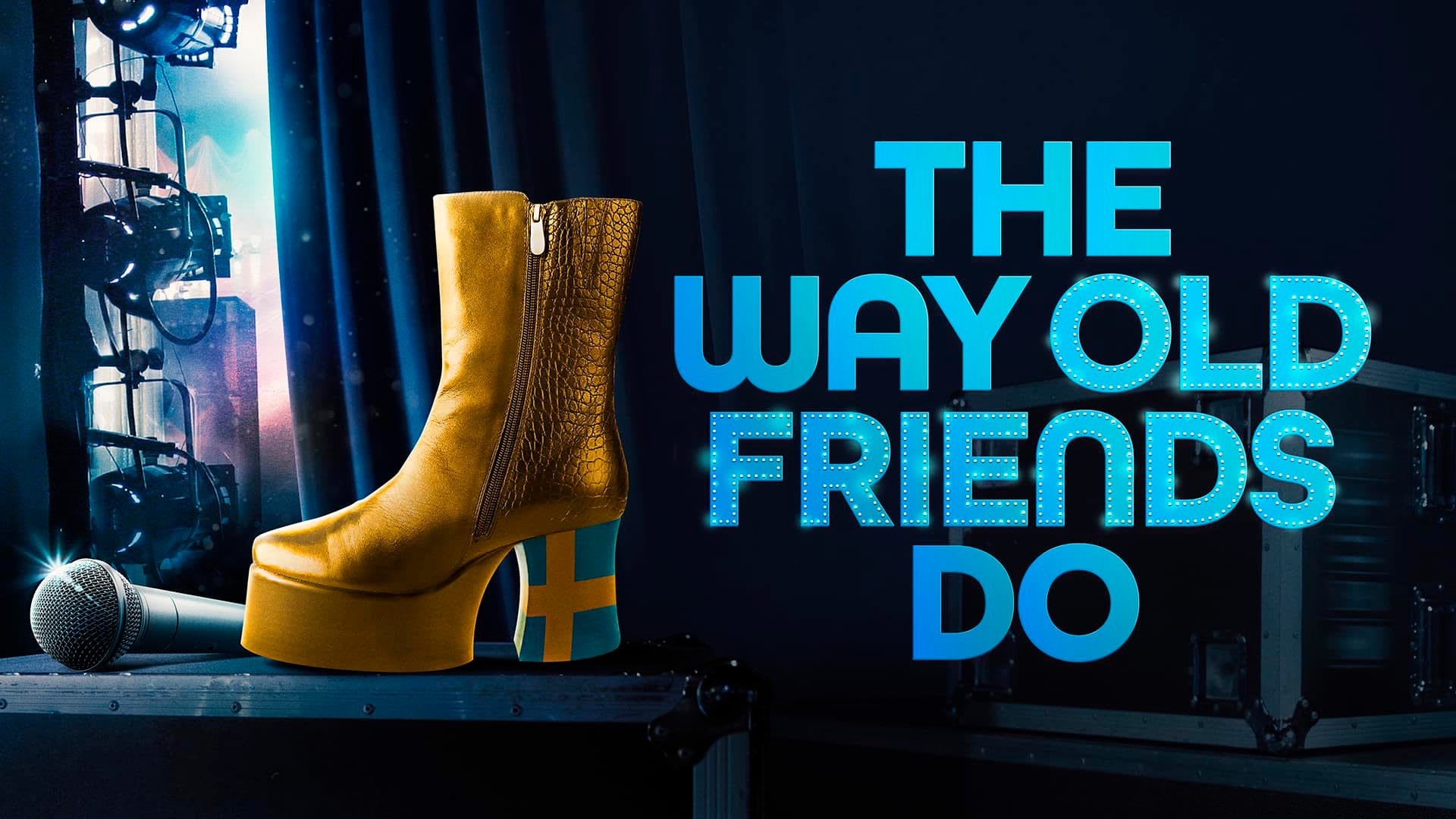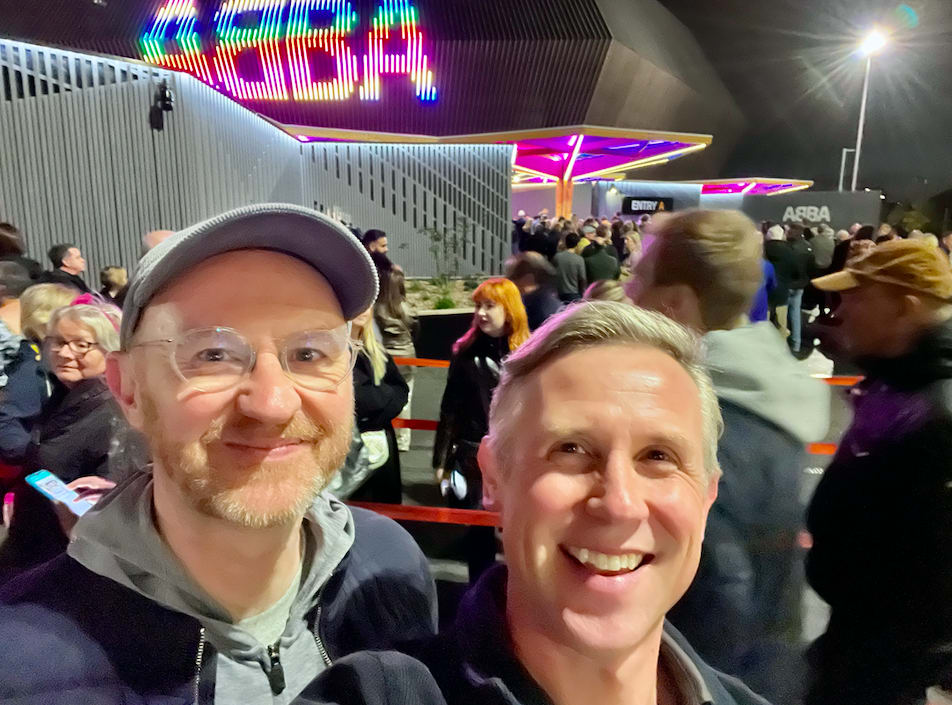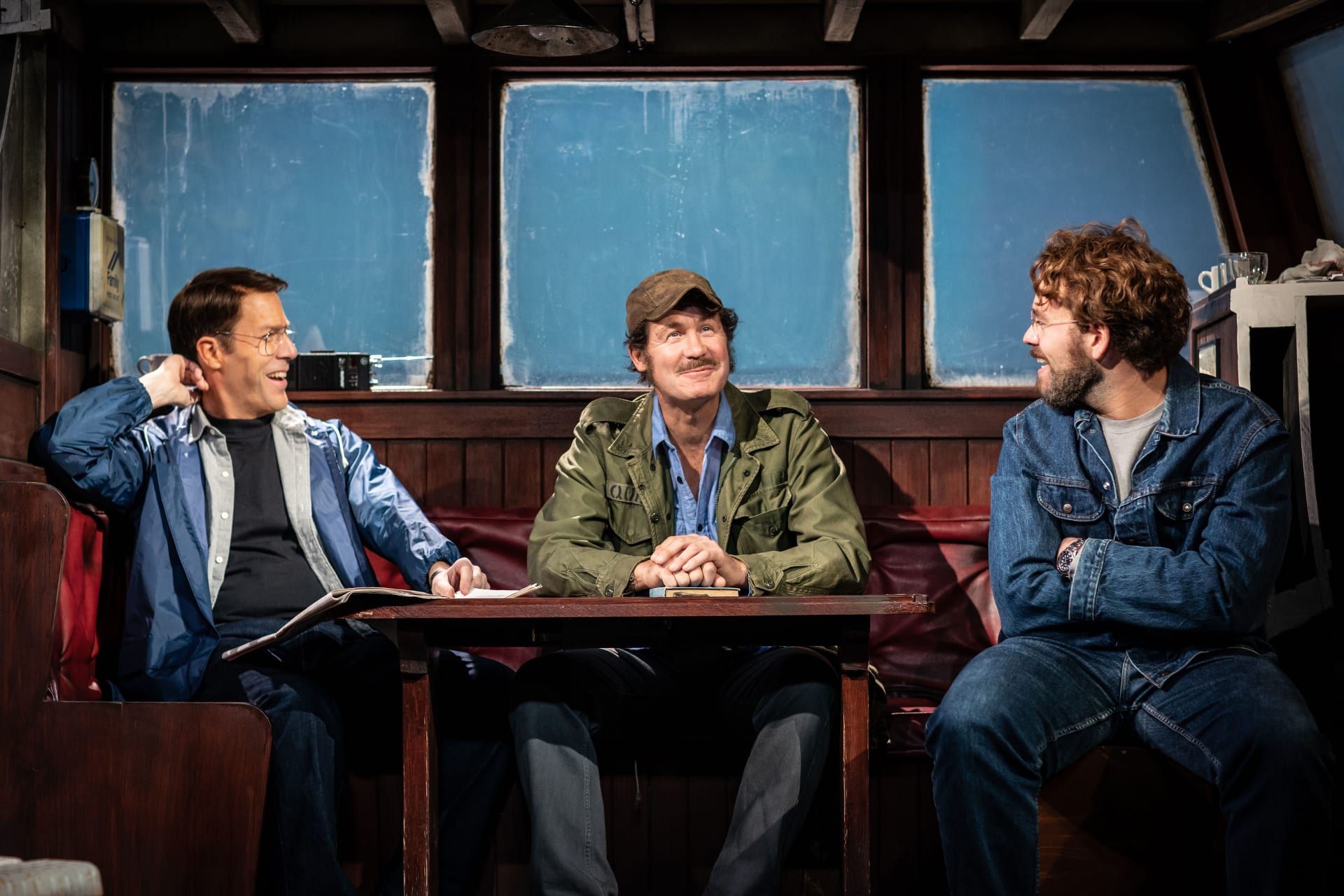James Seabright in association with Jason Haigh-Ellery and the Park Theatre presents the Birmingham Rep production.
Written by Ian Hallard | Directed by Mark Gatiss.
Following a season at Birmingham Rep at the start of 2023, Ian Hallard’s new play will be setting out on its inaugural tour of the UK which will include its London premiere at Park Theatre.
In 1988, two school friends tentatively come out to one another: one as gay, the other – more shockingly – as an ABBA fan. Nearly 30 years later, a chance meeting sets them on a brand-new path and they decide to form the world’s first ABBA tribute band – in drag. But can their friendship survive the tribulations of a life on the road which includes platform boots, fake beards and a distractingly attractive stranger? Simultaneously tender and laugh-out-loud funny, this heartfelt story will appeal to anyone who understands how it feels to be a fan: of ABBA or of anyone.
Sam Bennett spoke to Ian back in November, when he was in panto mode as Mrs Smee in Peter Pan (Towngate Theatre). Here, from his Islington home, the actor talks ABBA Voyage, Mark Gatiss, and his relationship with the theatre.
Where did the idea for The Way Old Friends Do come from?
It was kind of the confluence of a few things. People had asked me for years about whether I’d ever thought about writing anything myself. (I’d mainly done script editing, editing Mark Gatiss’ stuff, and we’d cowritten a few episodes of Poirot together for ITV – but obviously that was an adaptation of an existing novel as opposed to coming up with a new idea from scratch.) My response was always, ‘I don’t know what I’d write about that hasn’t already had a definitive play done about it.’ Then this just sort of came to me. It was partly write what you know, and I decided I’d write it as if I was going to be in it. I thought if my agent rang me tomorrow with a script, what would I be most excited about? Well, it would be to play a member of ABBA. So, I had to construct a storyline that enabled me to do that – the idea of a drag ABBA tribute band came to me. It’s about middle-aged men, being gay, and friendship as well. Gay stories tend to be romances rather than about friendship, and there isn’t an element of romance between these two characters, it’s their journey through the years. The ABBA stuff is the setting, the background, but it’s not a play about ABBA. It has a British comedy-Full Monty-Stepping Out feel; a bunch of amateurs getting together to put on a show. I did have to point out to some friends that I don’t actually intend to form a drag ABBA tribute band – they got more excited about that idea than the play itself.
Have you been to see ABBA Voyage yet?
Just the twice, so far. It is pretty spectacular. I went on the premiere night when the four of them actually went, so that was quite something. To not only see the show and be bowled over by how real it all feels, but then for the four of them to actually step on stage and take a bow together was pretty emotional. Mark couldn’t go and see it that night, it was actually the press night of his play in Chichester, he did understand why I needed to go to Voyage rather than his press night – last month I went again and took him for his birthday, he kept saying to me, ‘They’re there!’ The technology is extraordinary.
You’ve worked with Mark Gatiss a lot.
Not so much on stage. We’ve done one play together; when we were doing publicity for that six years ago, we had a lot of journalists asking us, ‘Do you think it’s going to be ok? Do you think it’s going to work?’ We just used to say, ‘Well, we do like each other, it’s not a chore to spend time in each other’s presence.’ Especially when we’re both busy with work and don’t get to see very much of each other one day to the next, actually having an excuse is quite nice. It wasn’t a foregone conclusion that he would direct The Way Old Friends Do. I didn’t tell him I was writing it at first. I thought, ‘I’m just going to see if I can get to the end of it, then I’ll see if I think it’s any good, then – if those conditions are met – I’ll show it to him.’ I sent it to him knowing that if he read it and thought it was terrible, he would say: ‘I love you dearly, but never show this to anyone ever again.’ Fortunately, he didn’t. But it was quite a while later that – when the Birmingham Rep and Sean Foley (artistic director) had said they wanted to do it – we then had that conversation about who was going to direct it. We did talk for a long time about whether Mark was the right choice, but ultimately because it’s such a personal story – it’s not autobiographical but there’s a huge amount of me in it – it would have felt even more daunting handing it over to someone else to direct. Putting yourself out there is scary enough as is it.
Is it going to be hard to take direction in a play you’ve actually written?
I’ve got enough experience now to know what the etiquette in the rehearsal room is. If you trust a director, you’ll go with what they’re doing, their vision – you’ll at least try it even if part of you is thinking, ‘That’s not exactly how I think it should go.’ Mark and I have very similar tastes and instincts about what works on stage and screen. It’s very rare that we’ll have a difference of opinion about whether we enjoy a play, film or TV show. In the past, Mark’s got to the interval of a show, turned to me and said, ‘I can predict exactly what you thought of that, you hated that, didn’t you?’ Yeah, I did. So, fingers crossed, we’ll be ok.
How has the theatre industry changed from when you first started out?
There is more of a concentration on performers’ mental health now, there’s more support, in terms of preventing bullying and tyrannical directors. I’ve been incredibly fortunate during my career, I’ve haven’t had a single director who has behaved badly – certainly not to me. But I think that those slightly abusive relationships in the workplace – that’s certainly a lot better than it was. In terms of my own personal experience, when I decided to do this, I went into it knowing it’s an incredibly unstable profession where 98% of actors are out of work at any one time. Having had the conversation with my family, I said, ‘I’m going to give it a go and if I fall out of love with it or realise I don’t want to do it any more, I’ll pack it in.’ I always said if the disappointments, the moments you’re out of work, or the rejection outweighs the joy I feel when I’m on stage – then I know it’s time to quit. Thankfully, that moment has never been reached so far.
The Way Old Friends Do is at Birmingham Rep 17 February-4 March before embarking on its UK tour which includes a run at Oxford Playhouse 15-20 May.










